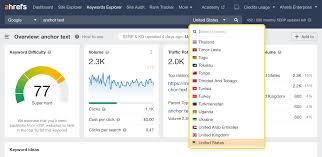The Power of SERP Keyword Research Tool
Keyword research is the cornerstone of any successful SEO strategy. Understanding what keywords your target audience is searching for can help you optimize your content and drive more organic traffic to your website. One powerful tool that can aid you in this process is the SERP (Search Engine Results Page) keyword research tool.
The SERP keyword research tool allows you to analyze the search engine results for specific keywords. By using this tool, you can gain insights into which keywords are driving traffic to your competitors’ websites, identify new keyword opportunities, and track your own keyword rankings.
With the data provided by the SERP keyword research tool, you can make informed decisions about which keywords to target in your content, how to optimize your website for better search engine visibility, and ultimately improve your overall SEO performance.
Furthermore, the SERP keyword research tool can help you monitor changes in search engine algorithms and trends, allowing you to adapt your SEO strategy accordingly. By staying ahead of the curve and leveraging the insights provided by this tool, you can position your website for greater online success.
In conclusion, the SERP keyword research tool is a valuable asset for any business looking to enhance its online presence through effective SEO strategies. By harnessing the power of this tool, you can unlock new opportunities for growth and ensure that your website remains competitive in today’s digital landscape.
5 Essential Tips for Effective SERP Keyword Research
- Use specific keywords related to your niche for more targeted results.
- Analyze the search volume and competition level of keywords to identify opportunities.
- Track the performance of your chosen keywords over time to make informed decisions.
- Utilize filters and sorting options to streamline your keyword research process.
- Consider long-tail keywords for less competitive but potentially high-converting options.
Use specific keywords related to your niche for more targeted results.
When utilizing the SERP keyword research tool, it is crucial to focus on using specific keywords that are directly related to your niche. By incorporating niche-specific keywords into your research strategy, you can generate more targeted results that are relevant to your audience. This approach not only helps you understand the search behavior within your niche but also allows you to tailor your content and SEO efforts more effectively, ultimately leading to improved visibility and engagement with your target market.
Analyze the search volume and competition level of keywords to identify opportunities.
By analyzing the search volume and competition level of keywords using the SERP keyword research tool, you can effectively identify valuable opportunities for optimizing your content and boosting your website’s visibility. Understanding the search volume helps you gauge the popularity of specific keywords among users, while assessing the competition level allows you to pinpoint keywords with less competition but high potential for ranking. This strategic approach enables you to target keywords that strike a balance between search volume and competition, maximizing your chances of attracting organic traffic and improving your overall SEO performance.
Track the performance of your chosen keywords over time to make informed decisions.
Tracking the performance of your chosen keywords over time is crucial for making informed decisions in your SEO strategy. By monitoring how your selected keywords are ranking on search engine results pages (SERPs) and analyzing their trends, you can gain valuable insights into the effectiveness of your optimization efforts. This data allows you to identify which keywords are driving traffic to your website and which ones may need further optimization. With this information at hand, you can make data-driven decisions to refine your keyword targeting, improve your search engine visibility, and ultimately enhance your overall SEO performance.
Utilize filters and sorting options to streamline your keyword research process.
Utilizing filters and sorting options while using the SERP keyword research tool can significantly streamline your keyword research process. By applying filters to narrow down search results based on criteria such as search volume, competition level, or keyword difficulty, you can quickly identify the most relevant keywords for your SEO strategy. Sorting options allow you to organize keywords based on various parameters, making it easier to prioritize and focus on high-potential keywords that align with your goals. This efficient approach not only saves time but also ensures that you are targeting keywords that have the potential to drive significant organic traffic to your website.
Consider long-tail keywords for less competitive but potentially high-converting options.
When utilizing the SERP keyword research tool, it is advisable to consider incorporating long-tail keywords into your strategy. These longer, more specific keyword phrases may have lower search volumes compared to broader keywords, but they often present less competition and can lead to higher conversion rates. By targeting long-tail keywords through the SERP tool, you can tap into niche markets, attract more qualified leads, and optimize your content for better visibility among potential customers seeking precisely what you offer.

